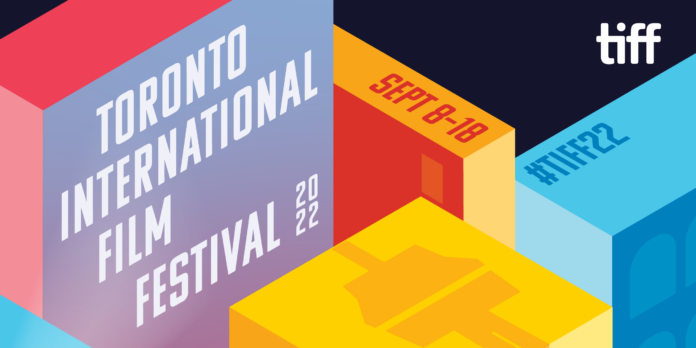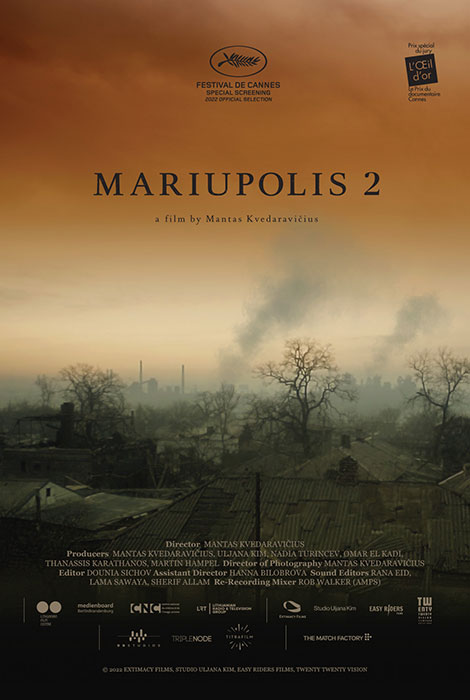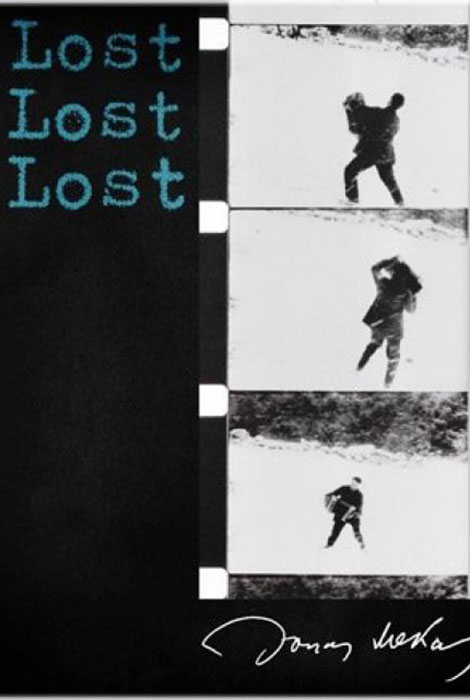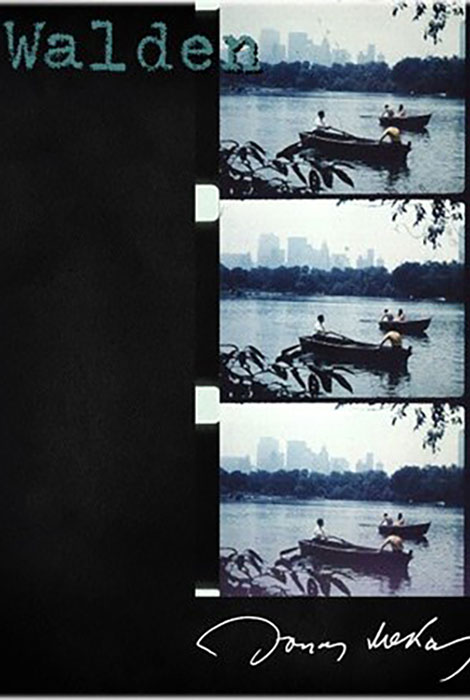
Summer may be over, but local culture is abuzz during September, the month of TIFF, the Toronto International Film Festival. This year, the schedule included documentaries by two Lithuanians.
Mantas Kvedaravičius was a Lithuanian filmmaker, anthropologist, and archaeologist known for war reporting in hostile areas was killed earlier this year while attempting to leave Mariupol, Ukraine.

Since 2014, following the events of Euromaidan, the ongoing war in Ukraine — sometimes fought with artillery, sometimes with bombardments of propaganda — has been raging between pro-Russian separatists loyal to Putin and nationalists whose sympathies are with Europe, NATO, and the West. When Russia’s ongoing attempts to consume, homogenize, and colonize Ukraine escalated to a full invasion on February 24, 2022, Lithuanian director Mantas Kvedaravičius returned to the besieged eastern city of Mariupol, where in his 2016 film Mariupolis he documented life under attack. His fourth and final film Mariupolis 2 is “an amalgam of sorrow and a testament to the human ability to endure unimaginable suffering”.
 On April 2, while attempting to leave amongst the chaos as the city was under almost constant bombardment, he was captured and murdered in cold blood. His fiancé, Hanna Bilobrova, managed to escape with the footage, and Kvedaravičius’s longtime editor Dounia Sichov (who worked on Mariupolis and whose TIFF ’22 credits also include Davy Chou’s Return to Seoul) carefully crafted this document of his precious last days with the city and people to whom he devoted his life.
On April 2, while attempting to leave amongst the chaos as the city was under almost constant bombardment, he was captured and murdered in cold blood. His fiancé, Hanna Bilobrova, managed to escape with the footage, and Kvedaravičius’s longtime editor Dounia Sichov (who worked on Mariupolis and whose TIFF ’22 credits also include Davy Chou’s Return to Seoul) carefully crafted this document of his precious last days with the city and people to whom he devoted his life.
“From a distance we see the Azovstal iron and steel works, where brutal fighting continued until the bitter end of the city’s collapse, and the Mariupol theatre — marked with white paint as containing sheltering children — where as many as 600 people were bombed on March 16. More closely, Mariupolis 2 is about human resilience under unimaginable adversity. Unfinished by nature, it consists of the filmmaker’s hideout alongside 40–50 citizens in the midst of surviving and vérité snapshots of everyday life in hell. Reaching beyond the screen, the film begs moral questions like: Would you move the dead bodies of your neighbours to claim their portable generator and heat your own shelter? Would you step outside for a cigarette? And would you live? Not for the faint-hearted, Kvedaravičius’s fourth and final film is an amalgam of sorrow and a testament to the human ability to endure.” (From an article by Dorota Lech for TIFF).

Jonas Mekas was a Lithuanian refugee who landed in New York City in 1949 at the age of 27. He was the first full-time critic at The Village Voice, writing about film. This poet, filmaker and artist has been called “the godfather of American avant-garde cinema” on many occasions. His work has been exhibited in museums and at festivals worldwide.
Programmed in celebration of Mekas’s centenary, TIFF 2022 presented two of his most acclaimed works: Walden and Lost, Lost, Lost.
This year at TIFF it was noted that experimental filmmakers everywhere are indebted to Jonas Mekas and the legacy he left behind. Mekas co-founded the Film-Makers’ Cooperative and the Filmmakers’ Cinematheque — now known as Anthology Film Archives — which today represents one of the largest collections of avant-garde cinema in the world. The Lithuanian American director, poet, and artist’s boundary-pushing works propelled the New American Cinema movement of the 1960s and ’70s to bold new heights. He became best known for his diaristic film style, which was both impressionistic and poetic as it brought everyday events to life. Programmed in celebration of Mekas’s centenary, TIFF 2022 presented two of his most acclaimed works: Walden and Lost, Lost, Lost.
 The first of these films, in 16-millimeters, “Walden (Diaries, Notes, and Sketches),” was shot between 1964 and 1969 and combines New York crowd scenes, circus performances and fragments of Mekas’s daily life with events like the first public appearance of the Velvet Underground, at a psychiatric convention, or John Lennon and Yoko Ono performing a “Bed-In for Peace.”
The first of these films, in 16-millimeters, “Walden (Diaries, Notes, and Sketches),” was shot between 1964 and 1969 and combines New York crowd scenes, circus performances and fragments of Mekas’s daily life with events like the first public appearance of the Velvet Underground, at a psychiatric convention, or John Lennon and Yoko Ono performing a “Bed-In for Peace.”
Insightful commentary was provided for TIFF by MoMA and Tate Modern musems of art.
“Compiled from material shot between 1964 and 1968, Walden stands as one of the most epic portraits of the ’60s New York art scene. Over the course of three hours, Mekas invites the viewer into a circle of friends and colleagues including John Lennon, Yoko Ono, Allen Ginsberg, Andy Warhol and Edie Sedgwick, as well as contemporary experimental filmmakers Tony and Beverly Conrad, Michael Snow and Jack Smith. Featuring quick-paced in-camera edits and a collage of recorded sounds, Mekas’s seminal film unfolds as a cinematic poem that effortlessly condenses years into hours.” (Tate Modern).
 “Personal and societal crossroads collide in Jonas Mekas’s narration while shaping footage from 1949 to 1963 into the diary-film opus Lost, Lost, Lost. At first a somber, arresting chronicle of his arrival as a political refugee, it gives way to an energetic document of the New York cultural scene Mekas all but single-handedly defined. Spanning Lithuanian street life in Williamsburg, anti-nuclear protests, Film Culture’s Lafayette Street offices, and the Living Theatre, Lost, Lost, Lost turns on a shift from Brooklyn to Manhattan, in the spirit of Alfred Kazin’s wonderment departing Brownsville on the elevated train in the 1930s. Melding social realism, intricately layered collage, and even trick film segments reminiscent of Georges Méliès — the result of Mekas and his brother Adolfas experimenting with their newly acquired Bolex camera — Lost, Lost, Lost foreshadows vital diary works to come. Mekas notes, ‘The sixth reel is a transitional reel where we begin to see some relaxation, where I begin to find moments of happiness. New life begins….’ ” (MoMA).
“Personal and societal crossroads collide in Jonas Mekas’s narration while shaping footage from 1949 to 1963 into the diary-film opus Lost, Lost, Lost. At first a somber, arresting chronicle of his arrival as a political refugee, it gives way to an energetic document of the New York cultural scene Mekas all but single-handedly defined. Spanning Lithuanian street life in Williamsburg, anti-nuclear protests, Film Culture’s Lafayette Street offices, and the Living Theatre, Lost, Lost, Lost turns on a shift from Brooklyn to Manhattan, in the spirit of Alfred Kazin’s wonderment departing Brownsville on the elevated train in the 1930s. Melding social realism, intricately layered collage, and even trick film segments reminiscent of Georges Méliès — the result of Mekas and his brother Adolfas experimenting with their newly acquired Bolex camera — Lost, Lost, Lost foreshadows vital diary works to come. Mekas notes, ‘The sixth reel is a transitional reel where we begin to see some relaxation, where I begin to find moments of happiness. New life begins….’ ” (MoMA).





























